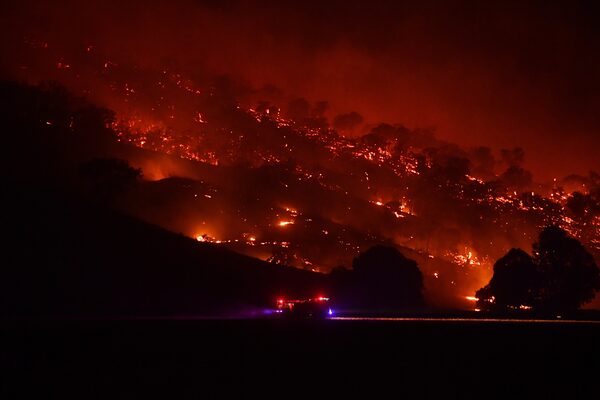HEAT DOWN UNDER

Rural FIre Service firefighters conduct property protection patrols at the Dunn Road fire on Jan. 10 in Mount Adrah, Australia.SAM MOOY/Getty Images
A swathe of Australia the size of South Korea is being razed by fire. The toll so far: 27 lives, more than 1,800 homes, a billion animals. But that’s probably a fraction of the eventual costs. Analysts who have done the sums expect a drag as much as 0.4% this quarter on an economy already stuck in second gear. Given the bushfires have consumed an area 20 times greater than a similar conflagration in 2009, the cost will dwarf the $3 billion price attached to that disaster.
Apocalyptic images of holiday-makers taking to the sea to escape flames could weigh heavy on tourism, which accounts for over 3% of Australia’s economy. A policy reaction is likely; money markets are already pricing in monetary easing, flirting with an even chance of an interest rate cut in February. Last year, they had assigned a less than 30% probability. The Aussie dollar is down 2% so far in 2020.
But the government has resisted linking the crisis to global warming. Its intransigence is likely to bring longer-term political costs. The fires add carbon emissions while decimating vital carbon-absorbing forests, so scientists are warning of more frequent and intense fires in future.
CHINA - HOME AND ABROAD
China's Vice Premier Liu He looks on during a meeting with U.S. President Donald Trump in the Oval Office of the White House in Washington on Oct. 11, 2019.Yuri Gripas/Reuters
Chinese Vice Premier Liu He will finally hop on a plane to Washington from Jan. 13-15 to sign a long-awaited Phase 1 trade deal. Hopefully, that will allow the world’s top two economies to bury the trade war hatchet that has kept them squabbling for more than 18 months.
How much damage that standoff has done to China’s economy may be visible in upcoming data. Trade figures on Tuesday are expected to show an increase in both imports and exports. And December’s GDP reading due on Friday is forecast at the well-established 6% level.
China looms large, too, over Taiwan’s Jan. 11 elections. The ballot pitches President Tsai Ing-wen, who favours formal independence from China, against the opposition’s Han Kuo-yu, who favours close ties with Beijing. Already a potential military flashpoint between Beijing and Washington, Taiwan’s role in global high-tech supply chains is another reason to watch the election.
BANKING ON
Traders work on the floor of the New York Stock Exchange in this file photo.Reuters
Wall Street keeps powering record highs, impervious to bad news, whether on politics or company earnings. And that’s unlikely to change after the fourth-quarter earnings season, which U.S. banks will kick off from Tuesday.
Refinitiv analysis suggests S&P 500 companies had a dismal quarter, with earnings-per-share falling 0.6% -- the second straight quarterly decline. That’s partly down to a strong quarter a year ago, but also to the drag from energy and industrials, which have borne the brunt of the trade war.
Banks may do better. JPMorgan, Morgan Stanley, Goldman Sachs and Wells Fargo report in the next few days, and forecasts are for 11.2% earnings growth across the sector. Wall Street’s bank index leapt 36% last year, even outgunning the gains by the underlying S&P 500.
BREXIT & CARN-EXIT
Mark Carney, Governor of the Bank of England, speaks at a Bank of England Financial Stability Report news conference in London on Dec. 16, 2019.POOL New/The Associated Press
So it’s settled: Britain will leave the European Union on Jan. 31. What’s less certain is whether 11 months will be long enough to reach strike a trade deal. Already dismissed by the EU as “impossible”, the tight deadline may limit any rebound in economic growth and investment. While there are signs of greater business confidence, last year was the weakest for UK retail sales since the mid-1990s, and industry and construction are languishing. Expectations are for 1.2% growth in 2020, the weakest since the 2008-2009 crisis.
Bank of England Governor Mark Carney has promised a “relatively prompt response” if weakness persists. But markets don’t seem to believe him, assigning a 60% chance of a 25-basis- point interest rate cut by December. Upcoming economic data could change their mind, however: figures on fourth-quarter growth, trade, industrial output, car registrations and inflation are due in the coming week. Carney himself won’t be overseeing any policy changes -- January’s meeting is his last as BOE governor.
OIL, TOIL AND TROUBLE
Equinor's Johan Sverdrup oilfield platforms and accommodation jack-up rig Haven are pictured in the North Sea, Norway Dec. 3, 2019.INTS KALNINS/Reuters
Markets have shrugged off the U.S.-Iran tensions with remarkable ease. Whether things continue this way remains to be seen, but a wider issue won’t go away - with so much in flux, what risk premium do Middle Eastern markets merit?
In decades gone by, such a dramatic development as the killing of Iran’s top military commander would have kept oil prices on the boil for weeks if not months. But with so much more of the black stuff coming from elsewhere these days, crude prices have fallen back to pre-attack levels.
There are several ramifications. One worth thinking about is that there is no longer the guaranteed boost to Gulf countries’ coffers. And the constant threat of war will also keep foreign investors wary of lending to regional governments and companies.